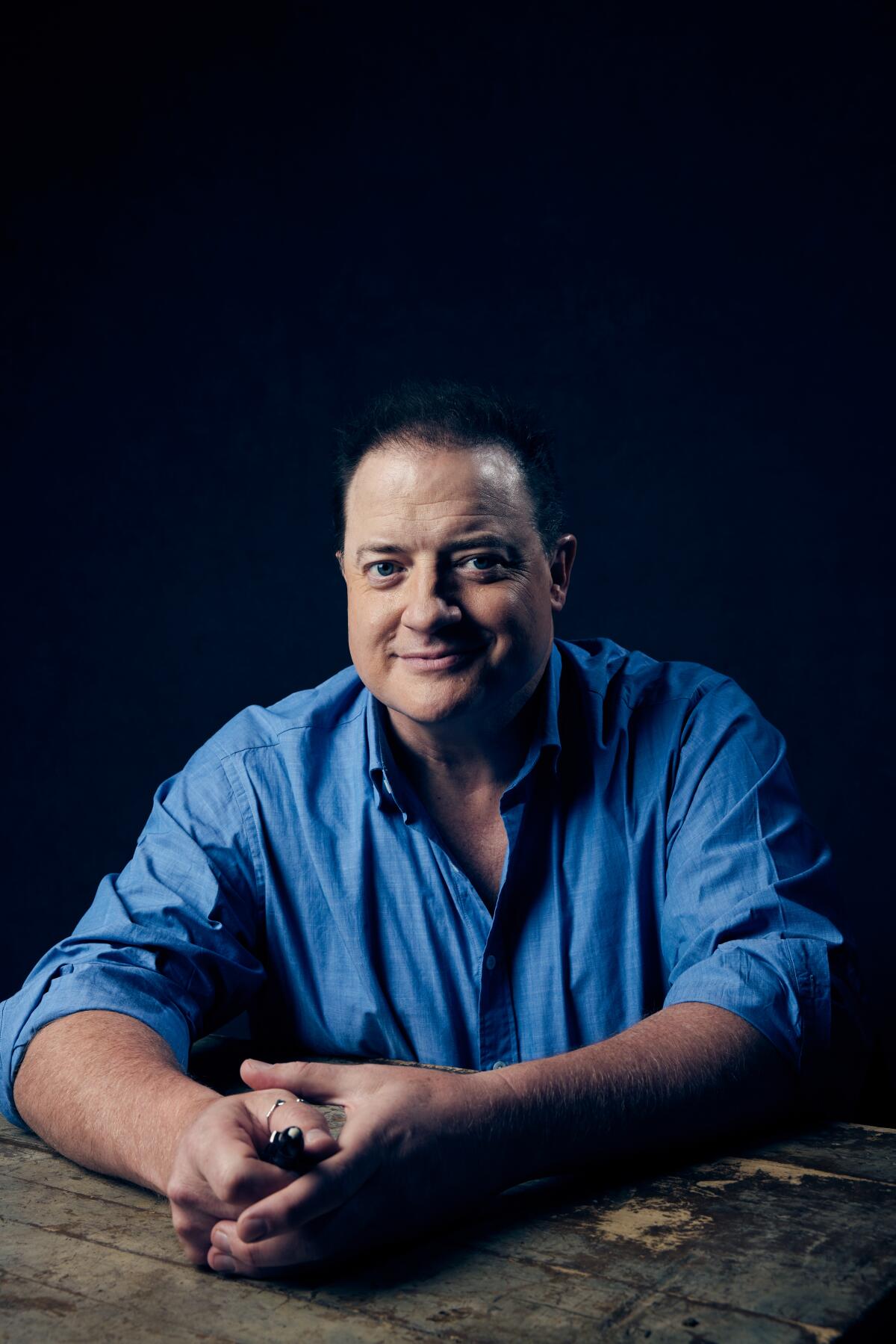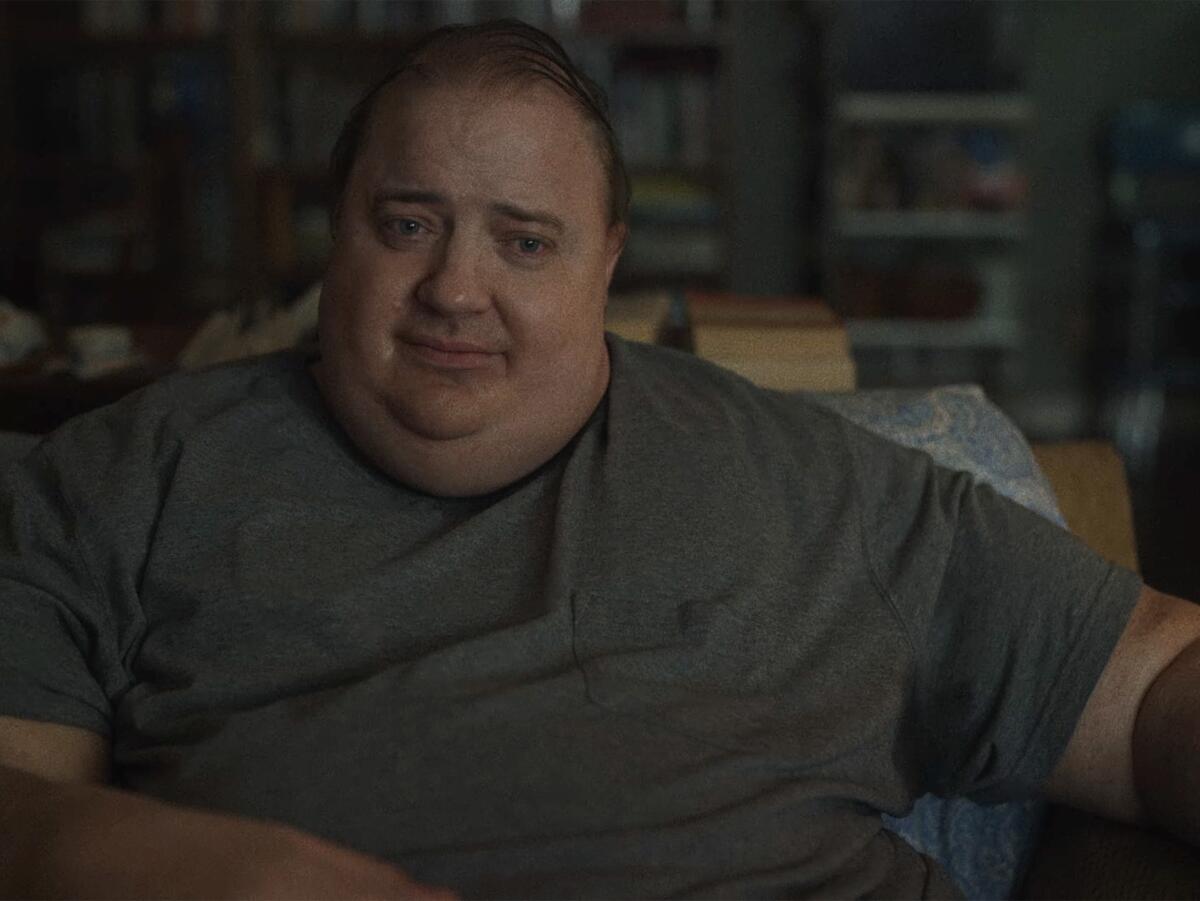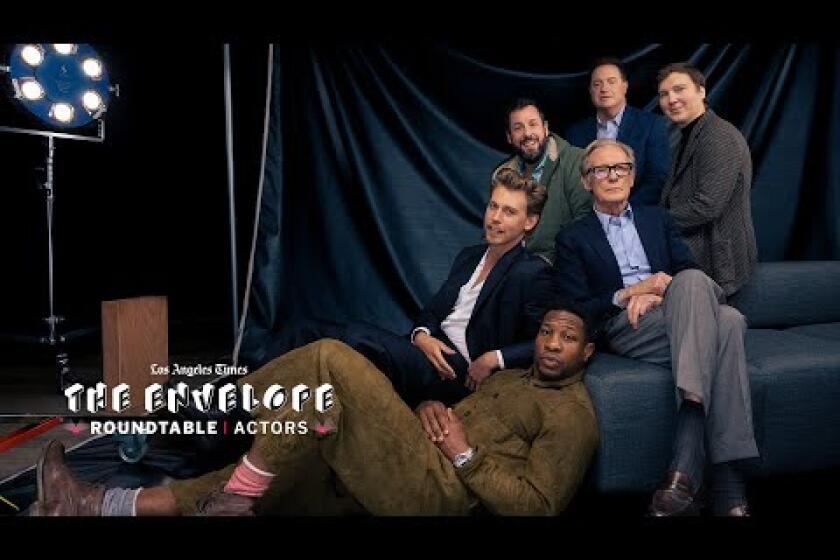Brendan Fraser knows the hurt — that’s why he stands by ‘The Whale’

Brendan Fraser didn’t get many awards as a boy. “I think the only prize I won was a bowling trophy in the fourth grade,” he says during a video call in early February. “It was for participation, I’m pretty sure — and they misspelled my name. It was like ‘Branten Fushner’ or something.”
The 54-year-old actor laughs self-deprecatingly. “So, yeah, this is new for me.”
The “this” he’s referring to is Oscar season, which this year has very much found him at its center. It’s been almost exactly five months since “The Whale” premiered at the Venice Film Festival, the crowd bathing him in a standing ovation that left him in tears. Since then, there’s been endless conversation and debate around his film, based on the play by Samuel D. Hunter, about Charlie, a gay online English teacher living with severe obesity and the mistakes he’s made as a father and lover.
Fraser has heard the accolades and also the criticism, and with his gentle, open demeanor — the same unembarrassed vulnerability he brings to the character — he still seems a bit overwhelmed by the reaction. Nominated for lead actor, his first nod from the film academy, he often returns to the advice his longtime friend (and “Gods and Monsters” co-star) Ian McKellen gave him about acceptance speeches: “Be good, be brief, be seated.”

Awards weren’t part of Fraser’s mindset when he first heard that director Darren Aronofsky wanted to meet with him. Reading the “Whale” script, which Hunter adapted from his own play, Fraser instantly connected with Charlie. “I felt like I knew this guy in a composite sort of way,” Fraser says. “He reminded me of a mentor of mine from school. He reminded me of friends in theater. He reminded me of my favorite characters from literature and films. From the response that I’m seeing to this movie, I think everyone knows Charlie.”
The extensive prosthetics that went into creating Charlie’s obese body have been well-chronicled, but less has been said about the distinctive speaking style Fraser invented for the character. The veteran star, who started out in endearingly goofy crowd-pleasers like “Encino Man” and “The Mummy,” has often projected giddy boyishness on screen. But Charlie’s unwavering belief in people’s inherent decency is tempered by his pained, hushed voice, which communicates his profound spiritual desolation.
“He is clearly encumbered by his body,” Fraser says. “And when the body has weight on it like that, it compresses the lungs. Breathing is a huge issue for people with obesity — there’s sometimes a rattle and a wheeze in the lungs. So his voice is pinched and fraught for all those reasons, but mostly because of the emotionality of the character.” Plus, due to the physical impediments imposed on Fraser by the prosthetics, the strain sometimes accentuated his anguished performance — especially when Charlie confides in Hong Chau’s tough-love nurse, Liz, or confronts Samantha Morton’s angry ex-wife, Mary. “Honestly, I didn’t know what was going to come out of me at any given moment,” he admits.
“I recognized the pain and the beauty in Charlie,” the actor says of the film’s protagonist. “There’s this ticking clock he has to try to make whole the one thing that he’s going to leave behind that really matters.”
Before signing onto “The Whale,” Fraser worried about capturing Charlie’s plight accurately, consulting with the Obesity Action Coalition. “Eating disorders are diabolical, and Charlie has an eating disorder,” he says. “You have to have respect for an illness, and Charlie hasn’t been acknowledging it — he has not embraced it, and he’s not reckoning with it.”
But although Charlie has congestive heart failure and just days to live, Fraser rejects the notion that the character is consciously killing himself through overeating. “He is not someone who has a death wish,” he insists. “He is someone who has gone through a great deal of emotional turmoil, and food-as-medicine is the wrong medicine for what really is ailing him — that’s just trying to fill the void of trauma, and that trauma is represented by the size of the body he carries with him. This guy’s hurting a lot, so when [his eating disorder] taps him on the shoulder and says, ‘You will deal with me now,’ he’s powerless — just in the same way as substance-abuse issues, gambling, sex. I’ve asked these specific questions of doctors [about] eating disorders and, yes, it’s the same neural pathways that give us the dopamine rush.”
Six Oscar contenders -- Austin Butler, Paul Dano, Brendan Fraser, Jonathan Majors, Bill Nighy and Adam Sandler -- talk about family, playing real people ... and mortality.
As Fraser describes Charlie’s condition, his voice occasionally falters, nearly getting choked up. He’s unafraid to let his emotions show — just as he doesn’t mind addressing accusations that “The Whale” is fatphobic or exploitative. “I respect those who don’t see eye to eye with the aims of this film,” Fraser says. “I don’t agree with them because I know that there’s no ill intent. I know I want to know if I — me, Brendan — have done any harm. But the answer I got from the OAC was, ‘Keep doing what you’re doing.’ We made the movie we wanted to make, and we made it correctly. And I stand by that.”
Still, the clear compassion Fraser has for this lonely soul doesn’t prevent him from being affected by those complaints. Creative people learn to develop a thick skin to handle rejection and criticism. But talking to Fraser, he seems to have chosen to remain unshielded — that openness has informed the often-buoyant characters he’s played, but it’s just as apparent in Charlie, a mournful man whose hurt is etched all over his face.
“To have a thick skin means you’re going to take a few hits and it’s not going to hurt you physically,” Fraser suggests. “It doesn’t mean it won’t hit you emotionally. It does. It absolutely does.”
But he takes comfort in knowing that he played Charlie for the right reasons. Fraser has always been an earnest person, and that earnestness has carried him throughout his career — from the early stardom to the later fallow years and, now, during this gratifying upswing. Not that it hasn’t sometimes led to potentially humiliating situations. He still remembers, just a few years out of conservatory training, he met with his first agent, proudly but naively brandishing his bachelor of fine arts in acting degree.
“Like a job application, I wanted to show them, ‘Look, I’m certified! I’m licensed to operate this equipment!’” he recalls, laughing at himself. “And the agent was like, ‘What the f— is this?’ But it was like, ‘I belong.’ Everybody wants to belong in one way or the other.”
Fraser’s fond look back
In his 30-plus-year film career, Brendan Fraser has starred in hit comedies, action-adventure blockbusters and acclaimed indies. Below, he provides some brief memories from his most indelible movies.
“School Ties” (1992)
“It was the first feature film for me. It wasn’t lost on me [during the audition] that this is my shot right here — this is it. They hired me, but I couldn’t believe it. I was constantly expecting someone to walk up to me and hand me a dish towel and say, ‘Get back in the kitchen, Fraser.’ I hope I never lose that.”
“Encino Man” (1992)
“Terrence Malick met me for ‘The Thin Red Line.’ He actually offered me a job and then forgot he offered me something. [laughs] But he loved ‘Encino Man.’ He’s like, ‘Where did that guy come from? He just came down from the moon or something. He was like Charlie Chaplin. He was like Buster Keaton.’ I thought the same thing.”
“Gods and Monsters “ (1998)
“The first time I met [Ian McKellen] in person, he was such a delight. He is such a lovely man. But he also said, ’Well, let’s get to work now — we got to put our big boy pants on and go do this job. This is exciting and fun, but here we go.’ He’s a hero of mine. He’s just brilliant.”
“The Mummy” (1999)
“Rick O’Connell was a character born of [writer-director] Stephen Sommers having watched all of the swashbuckling films of the ‘40s, ‘50s and ‘60s. Rick is someone who has a great deal of irascible energy. He’s not taking anything too seriously. But if you’re playing Rick and you don’t believe in the circumstances of the reality of that movie, then your audience won’t either.”
More to Read
From the Oscars to the Emmys.
Get the Envelope newsletter for exclusive awards season coverage, behind-the-scenes stories from the Envelope podcast and columnist Glenn Whipp’s must-read analysis.
You may occasionally receive promotional content from the Los Angeles Times.










